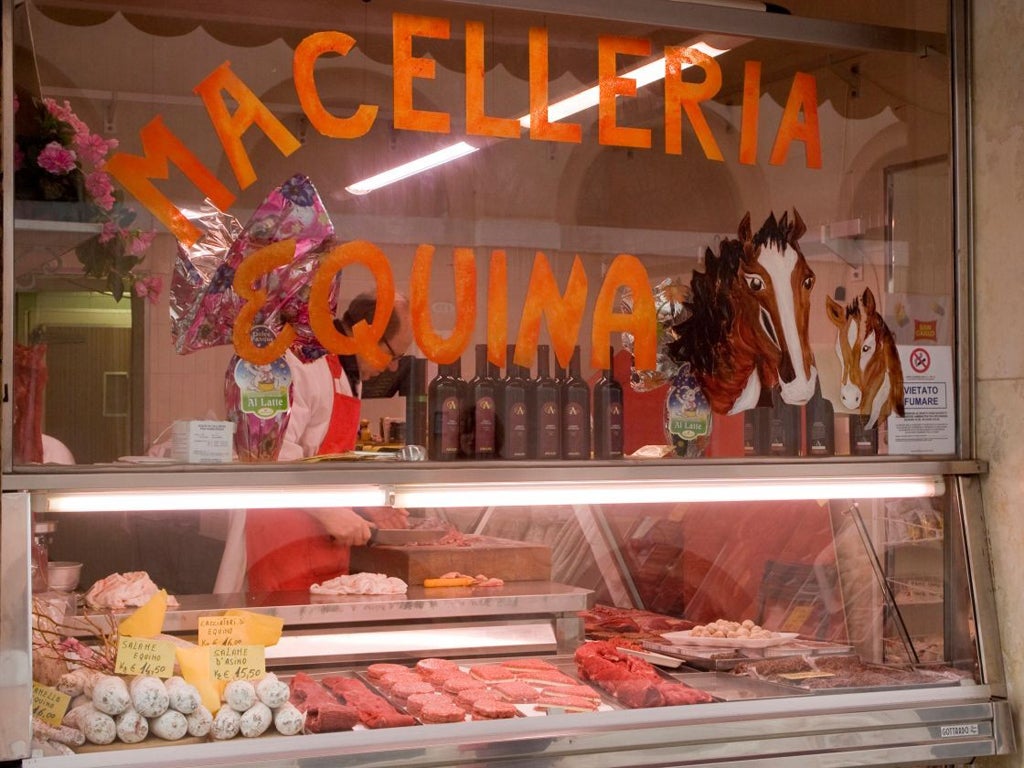Racehorses face butcher's axe as recession forces courses to close
Owners find it cheaper to sell their thoroughbreds as racegoers abandon the sport in their droves

Your support helps us to tell the story
From reproductive rights to climate change to Big Tech, The Independent is on the ground when the story is developing. Whether it's investigating the financials of Elon Musk's pro-Trump PAC or producing our latest documentary, 'The A Word', which shines a light on the American women fighting for reproductive rights, we know how important it is to parse out the facts from the messaging.
At such a critical moment in US history, we need reporters on the ground. Your donation allows us to keep sending journalists to speak to both sides of the story.
The Independent is trusted by Americans across the entire political spectrum. And unlike many other quality news outlets, we choose not to lock Americans out of our reporting and analysis with paywalls. We believe quality journalism should be available to everyone, paid for by those who can afford it.
Your support makes all the difference.It is not a good time to be a racehorse in Italy. Many Italians already had a taste for cavallo, but with the economy dipping and people staying away from the races, horse steaks, stews and cutlets are a set feature on many more menus.
As the bets dry up, and with many of the traditional New Year's Day meetings cancelled for only the third time since the Second World War, the Italian press has been full of reports suggesting that many of Italy's 15,000 racehorses could face a one-way trot to the butcher's shop. Last weekend, 200 officials and horse owners from the Agnano hippodrome carted their animals around the streets of Naples in protest at the crisis affecting their industry. In the north of Italy, the racecourses in Bologna and Cesena closed at the end of the year without knowing when, or if, they will reopen.
Tomaso Grassi, boss of Hippogroup, which runs both courses, said the 480 horses and the people who looked after them faced an uncertain future. "There's going to be some major downsizing in horse-racing," he added, "and it will be hard to find a home for all the animals."
The situation is so bad that a leading animal rights group is calling on the government to step in to prevent thousands of racehorses from being butchered illegally. In Italy, animals used for racing cannot be eaten and Mr Grassi is adamant that the horses at his course would not suffer this fate. "But we fear many Italian racehorses will end up at illegal butchers, because there are so few controls on these places," Ilaria Ferri, the scientific director of the national animal protection agency, told The Independent. "We also fear many of the animals may suffer more cruelty. The Government must act by making it illegal to kill horses in the same way it's illegal to kill cats, dog and other pets."
For those who feel squeamish at the thought of eating horse meat, some areas of Italy, particularly in the south, are probably best avoided. If you walk in certain parts of Catania, it is hard to avoid the smell of frying horse steaks – many Italians simply regard horses in the same way as cattle or sheep. Ms Ferri said, however, that the repercussions could be serious for the people who ate illegally butchered racehorses, because racing animals were often, "administered drugs and substances are extremely harmful for humans".
Fans of racing and those who work in the industry say ministers should step in and offer to support the jobs of the 50,000 people, and 15,000 horses, involved in the sport. Last month, newspapers said Italian racing's governing body, would cut its grant to racecourses by 40 per cent this year to €61m.
A meeting between racing industry figures and the government to find a way out of the crisis was scheduled for last week, but most pundits expect the pleas for financial help to fall on deaf ears; Prime Minister Mario Monti's administration is currently trying to cut public spending, not increase it.
Most animal right activists agree that in terms of animal cruelty, the numerous illegal palio-type races are a more pressing problem. In some parts of Italy, particularly Sicily, gambling on street races is big business. Police often swoop on events in Palermo and Catania in an attempt to bust a racket thought to earn the Mafia hundreds of millions of euros.
Join our commenting forum
Join thought-provoking conversations, follow other Independent readers and see their replies
Comments